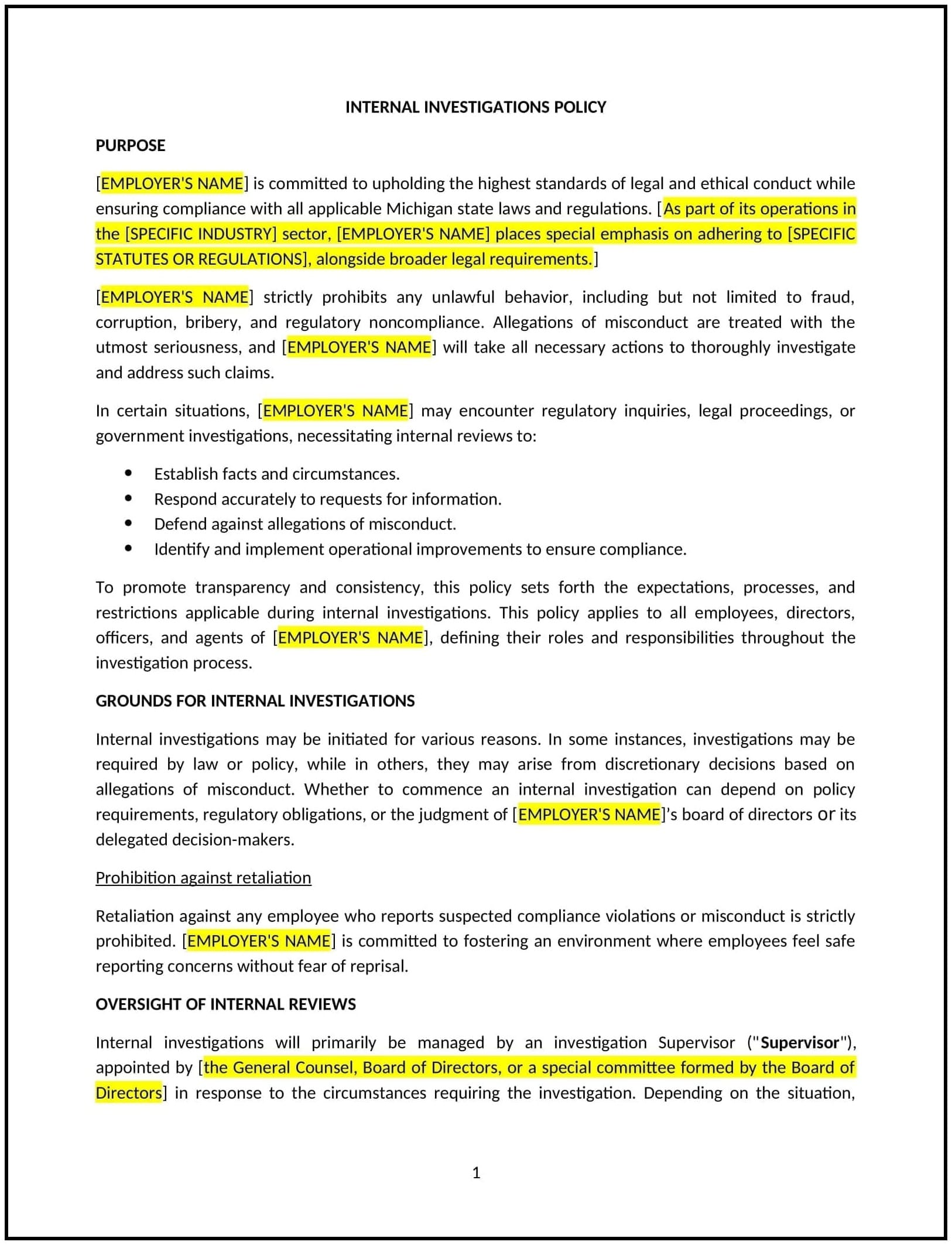Internal investigations policy (Michigan): Free template
Got contracts to review? While you're here for policies, let Cobrief make contract review effortless—start your free review now.

Customize this template for free
Internal investigations policy (Michigan)
An internal investigations policy provides Michigan businesses with guidelines for conducting investigations into alleged misconduct, violations of company policies, or legal or ethical breaches. This policy ensures that investigations are conducted in a fair, confidential, and consistent manner, protecting both the rights of employees and the integrity of the business.
By adopting this policy, businesses can address workplace issues promptly and appropriately, mitigate risks, and ensure compliance with both company policies and legal requirements.
How to use this internal investigations policy (Michigan)
- Define what constitutes misconduct: Clearly outline the types of behavior or actions that may trigger an internal investigation, such as harassment, discrimination, theft, fraud, or violations of company policies.
- Establish reporting channels: Specify how employees should report misconduct, whether through a dedicated hotline, email, or direct communication with management or HR, ensuring that all reports are taken seriously and confidentially.
- Outline investigation procedures: Set out a clear and consistent process for investigating allegations, including steps such as gathering evidence, interviewing witnesses, and conducting fact-finding investigations.
- Maintain confidentiality: Emphasize the importance of confidentiality throughout the investigation to protect the privacy of employees involved and avoid unnecessary disruption to the workplace.
- Assign investigation responsibilities: Identify the individuals or teams responsible for conducting investigations, such as HR personnel, management, or external investigators, ensuring that those conducting the investigation have the appropriate training and authority.
- Provide fair treatment: Ensure that all parties involved in the investigation—accused employees, witnesses, and complainants—are treated fairly and with respect throughout the process.
- Set timelines for resolution: Establish clear timelines for completing investigations and resolving the issue, ensuring that investigations are handled in a timely and efficient manner to avoid unnecessary delays.
- Determine disciplinary actions: Define the possible consequences of misconduct and outline the process for determining appropriate disciplinary action, including warnings, suspension, or termination, based on the severity of the violation.
- Document findings: Require thorough documentation of all investigation findings, including evidence, witness statements, and the final outcome, ensuring that the process is transparent and accountable.
Benefits of using this internal investigations policy (Michigan)
This policy provides several key benefits for Michigan businesses:
- Promotes fairness and transparency: A well-structured internal investigations policy ensures that investigations are conducted impartially, protecting both the rights of employees and the business’s interests.
- Reduces legal risks: By addressing misconduct promptly and consistently, businesses reduce the risk of legal claims, such as discrimination or wrongful termination lawsuits, and mitigate potential reputational damage.
- Enhances company culture: A clear policy for handling investigations helps create a culture of accountability, where employees know that any violations of company policies will be addressed fairly and swiftly.
- Supports compliance: The policy ensures that businesses comply with Michigan state laws and federal regulations related to workplace conduct, such as anti-discrimination laws, harassment prevention, and employee rights.
- Increases employee confidence: When employees see that misconduct is taken seriously and addressed appropriately, they are more likely to feel safe and confident in the workplace, leading to improved morale and engagement.
Tips for using this internal investigations policy (Michigan)
- Communicate the policy: Ensure that employees are aware of the internal investigations policy by including it in the employee handbook, during onboarding, and through regular internal communications and training.
- Train managers and HR: Provide training for managers and HR personnel to ensure they understand how to conduct investigations fairly, legally, and effectively, following the company’s policy.
- Keep investigations confidential: Emphasize the importance of confidentiality throughout the investigation process to prevent unnecessary harm to employees and protect sensitive information.
- Ensure impartiality: Investigations should be impartial, and businesses should avoid conflicts of interest by ensuring that the individuals conducting the investigation are unbiased and objective.
- Monitor and evaluate: Regularly monitor the effectiveness of the investigation process and evaluate whether the policy is achieving its intended outcomes, making adjustments as needed.